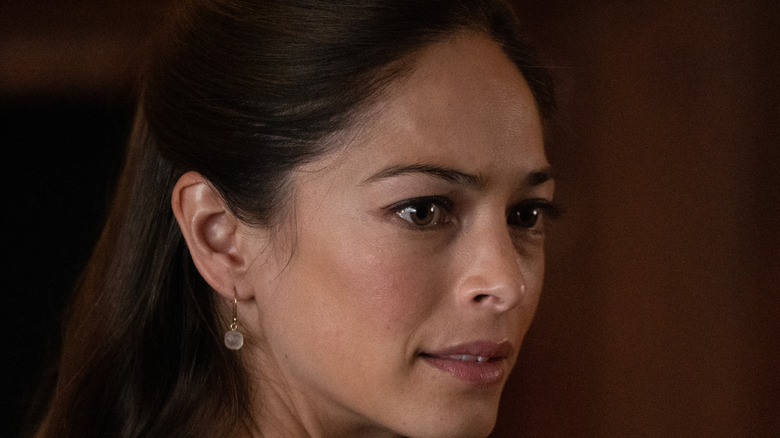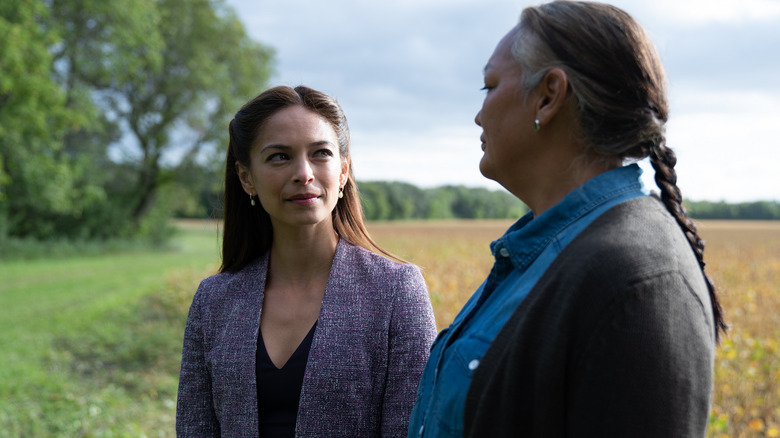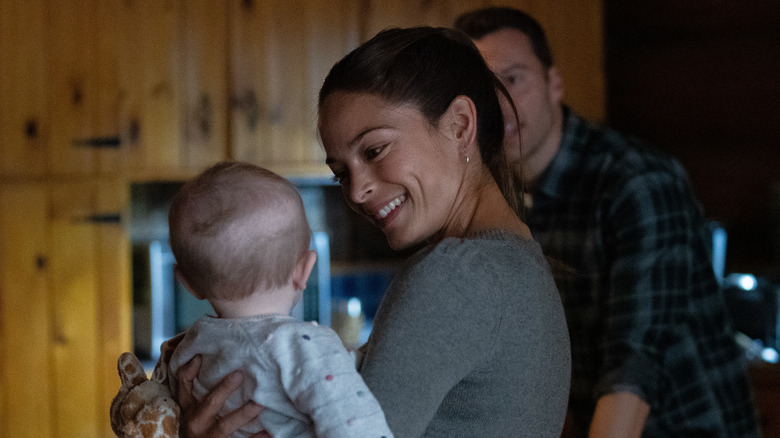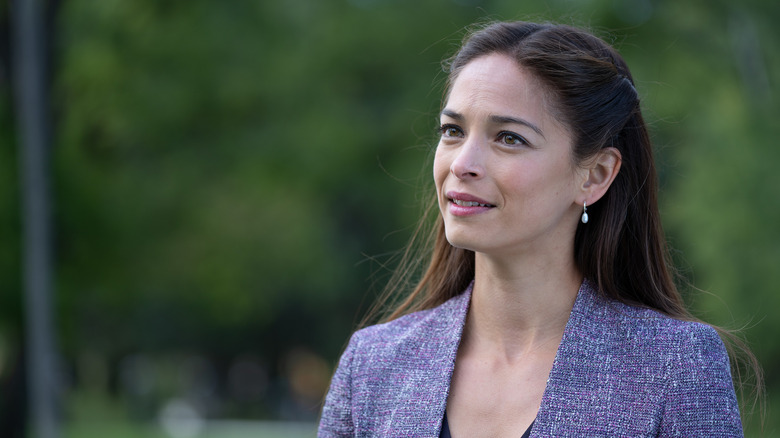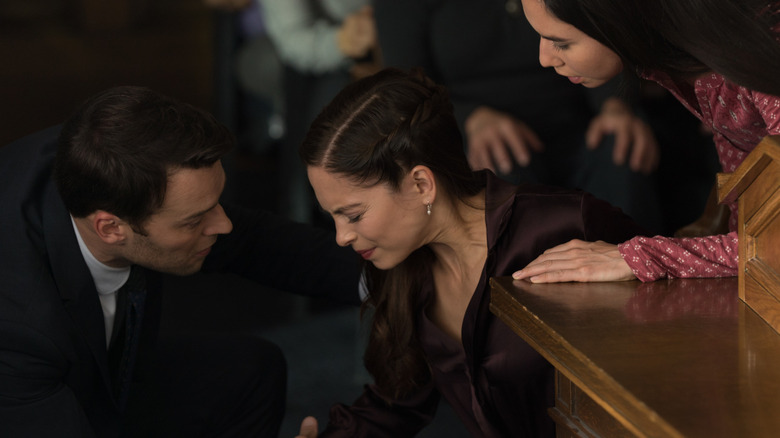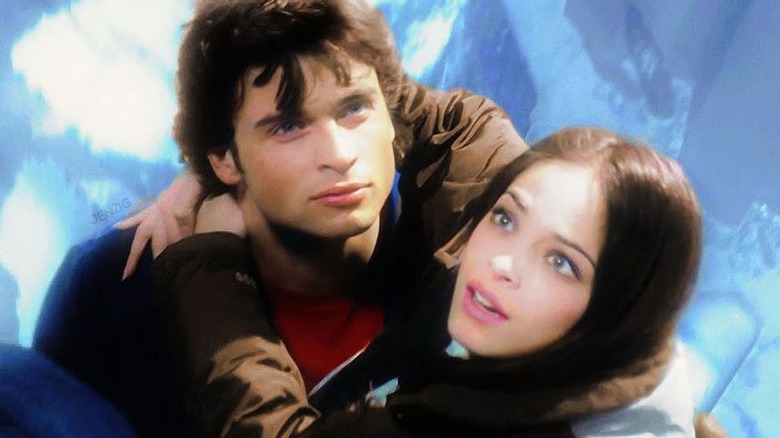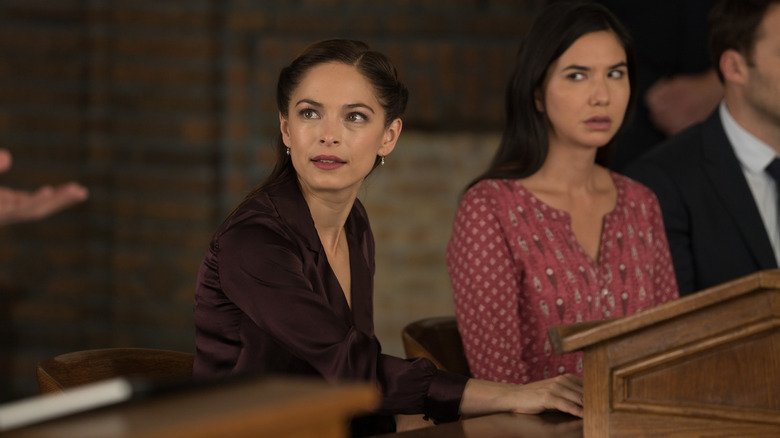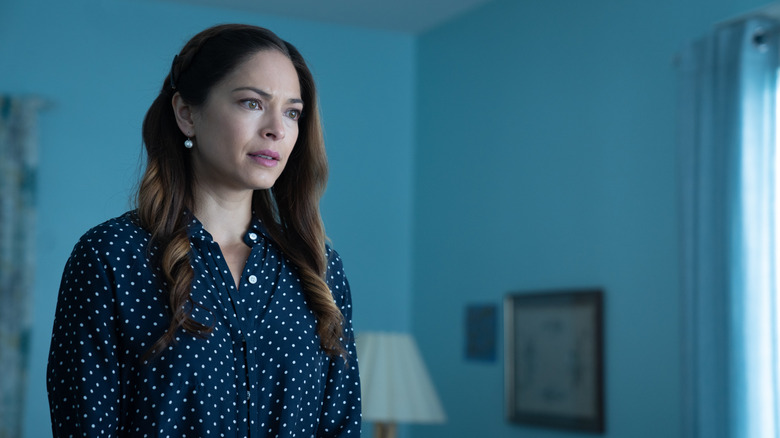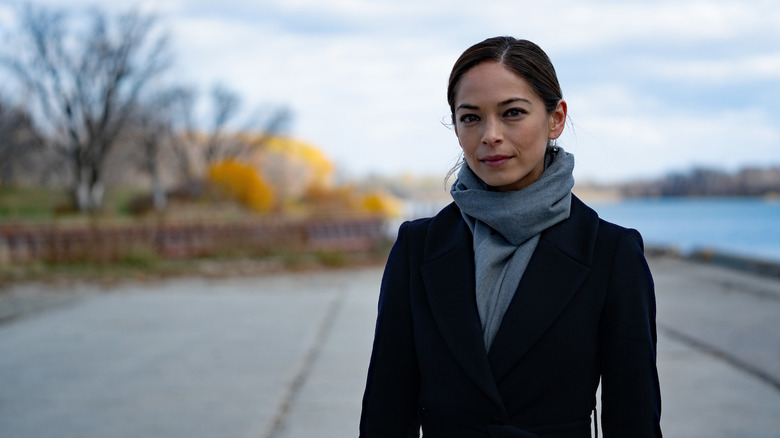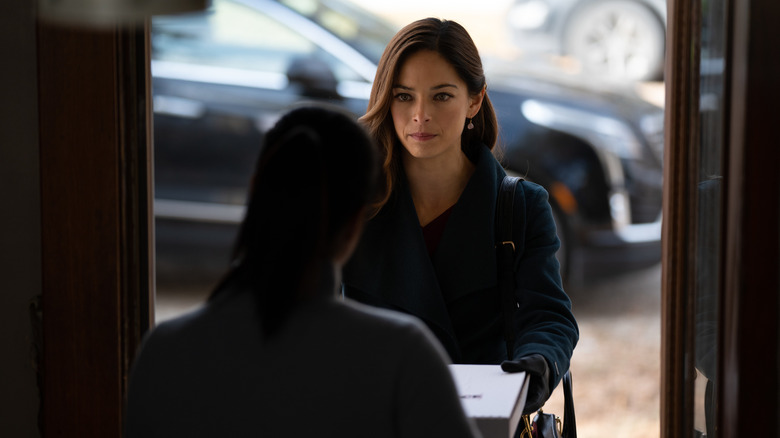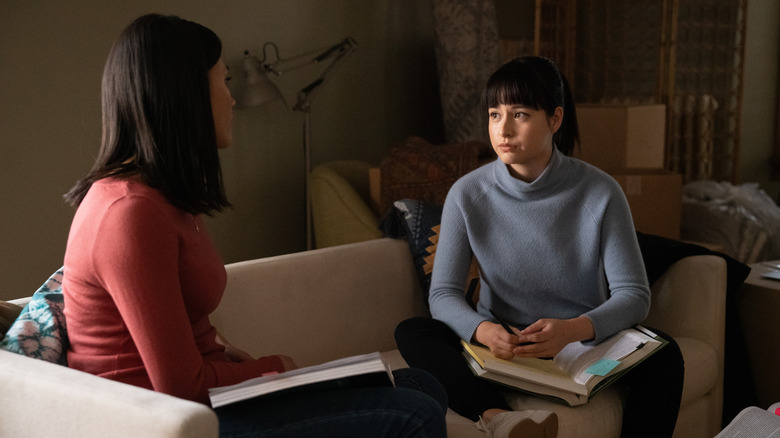Kristin Kreuk Dishes On Burden Of Truth's Dramatic Final Season - Exclusive Interview
A new season of the CW legal drama "Burden of Truth" is finally underway, and with it, a new set of problems for Kristin Kreuk's character Joanna to tackle. Though for law prodigy Joanna, her cases offer less of a challenge than the newborn baby waiting for her at home. That would stress anyone out.
Before Kreuk started facing down corrupt Canadian businesses on "Burden of Truth," she got her big Hollywood break with a leading role as Lana Lang on "Smallville." It's no easy task playing Clark Kent's first love, but she nailed the role — and between filming the show, she played Laurel Yeung in "Edgemont" and Fiona in "EuroTrip." Later, she appeared on "Chuck" before landing another lead role on the CW series "Beauty and the Beast." And for anyone upset that "Burden of Truth" is ending, don't worry. Kreuk is slated to appear as Charlie in the upcoming "Jack Reacher" series, "Reacher." It looks like we'll see Kreuk back on the small screen in no time.
Looper spoke to Kristin Kreuk during an exclusive interview for "Burden of Truth," and she dished on the ending of the show, the importance of the subjects it tackles, and the biggest differences between a law drama like "Burden of Truth" and a genre series like "Smallville."
Tackling Indigenous injustices
I love the show's deep ties to Indigenous culture and the issues many of these communities still face. How have those storylines helped shaped the series, and how do you think it helps shed light on some of these injustices that still happen today?
Yeah. Our show is about intergenerational trauma — I mean, to me it is anyway. I think the themes are fairly well represented. And from the Indigenous side of things, on our show, there are a few writers in the writers room who are Indigenous. Our production company is more than 50% Indigenous-owned. We have Indigenous directors. So it's a show that has been influenced by people's lived experiences and the issues that they have in their communities, and they want to talk about.
We're really looking at this season, especially ... we're looking a bit at land and how Indigenous land has been stolen, misused, how people have been threatened and treated poorly, and how that continues in various ways today. And not only that, but what the ripple effects of that have been on multiple generations. The woman who is in this season that Joanna is representing, you eventually meet her daughter, and you start to see what her life has been like because of certain situations.
There's no single way to be a mom
I had a full-on jaw drop moment when the mommy group moms shamed Joanna for being a working mom in the Season 4 premiere. I'm sure the line "What kind of mother are you?" resonated with a lot of moms watching the show. And as the daughter of a working single mom, I grew up seeing the resilience that takes. Why do you think this story is important to tell, how did you resonate with this character arc, and how do you think this new direction impacts the final season and the show's ending?
Okay, yeah. I'll start with I'm not a mom. A lot of my friends are moms. And honestly, watching the discourse, the judgment, the intensity that goes with the decisions that moms are making — their lives are really intense. And not only that, obviously, society puts a ton of pressure. "You should be doing this. You should be breastfeeding. No, you should be doing this. You shouldn't be home. You should be home." There's a constant barrage of intense information. And I think that we wanted to tell that story just purely because that's an important story to tell.
But also, for Joanna, to push her because she feels so confident in her job and she feels so lacking as a mom, and she couldn't breastfeed, and she should have been able to and what was her problem? Because in her mind, that's something you can overcome — you can just fix it. And she finds comfort in her work, but then she feels guilty that she doesn't find that same comfort in her child. And I think that these are really nuanced struggles that women go through in different ways when they have children. What other questions was I answering? [Laughs]
New parents
How do you think this direction impacts the final season and the show's ending?
Okay. So, like I said before, because the show is in part about intergenerational trauma, we thought it would be really valuable to take a look at how Billy and Joanna handle their own trauma while raising a new human. And they both have dealt with it in such different ways. Billy wants the comfort and consistency of a close, warm family unit and Joanna can't quite handle that, and that doesn't make her feel safe. So they have to try and find a way to make each other feel safe and to raise their child and learn that they're not beholden to the patterns that they came from and that their awareness and willingness to work on those things is going to be really beneficial for whatever they name their child.
Have you finished filming yet?
Yeah, we shot in the fall of 2020.
Tying up loose ends
What was the last day on set like? And do you feel like Joanna's journey is complete, or do you wish we had a little bit more time with her?
The last day on set was lovely. I mean, sad, but I feel like I'll see lots of these people again. I want to work in Winnipeg again. I want to work with the same crew again. I have a project that I'm working on in development with Kyle [Irving], who's one of our producers. So it was sad, but we were so happy that we had done the show for four seasons and through COVID, which was such a challenge. And I do think that we've come to the end of the story we need to tell with Joanna right now. Is her story done? Obviously not. It never is, but I think that we've come to a tidy conclusion for both Billy and Joanna.
What was the most challenging scene to film?
Most challenging? In the season?
It can be any time.
I mean, personally, the most challenging scenes for me are always the big climax courtroom scenes. We don't have any this year because, with COVID, we didn't want to have that many background performers in the room at the same time. But those are tough because they're at the end of the show. They're generally night shoots. I'm really shy, and I'm fine at performing, but when I have to do monologues in front of all those people, I get really sweaty and nervous, so those are always tough. And we're rushing. We have to do 10, 12 pages a day, which is a lot.
From superheroes in capes to superheroes in court
What are the biggest differences or challenges between working on a drama like "Burden of Truth" and a sci-fi show like "Smallville"?
I think some of the biggest differences, I mean, they're both dramas in the end. They're serious. But genre tends to have a little more imagination, so you're definitely pretending crazy things are happening, and they also tend to have a bigger budget. "Smallville" had a budget, so we could take longer to get stuff done. We had a second unit, we had big action sequences that we had time to shoot, and it just isn't like that when you're doing TV that just doesn't have a ton of money. You've got to be a lot more creative, and you can't take as much time, you just have to blast through everything.
Do you find it more or less difficult where everything's a little bit more people-focused in a show like "Burden of Truth," rather than having all of the sets and all of the costumes and the background and everything's happening? What's easier for you or more interesting?
Well, they both have cool things about them. I like doing something like "Burden of Truth" in that it feels a little more indie. And most of the scenes are scenes. Obviously, it's a law show, so there's exposition, and you've got to explain what's going on and help the audience understand the paperwork that you're reading. But conversely, in a superhero show or in a less intimate show, the fight sequences are really fun. It's fun to go to set on those days. They're nit-picky for actors, but they're a joy to be able to go put on a wire or whatever and fly around. There's something that's just playing about that.
The women who came before Joanna
Joanna is such a passionate lawyer. Did you do any law-related research to prep for the role, and were you inspired by any real-life women in your portrayal of her?
I did a bunch of research, and I actually tried to find lawyers who maybe people don't like that much who are really competent. Maybe I won't name them [laughs], but there are lots of interviews with women who have amazing power suits, and they're really strong, and they're brilliant. They're brilliant. And I did that research just to get a feel of how you have to hold yourself. Because I read a few papers essentially about how women lawyers still struggle, especially in trials, they want both femininity and not, I mean, we all watched that OJ TV show, but that stuff still happens. So I was playing with how much I need to be aware of that and how much I need to give Joanna some of that awareness.
Can you tease where the show is headed in the second half of the season?
The second half of the season follows the case from Joanna's past that has come to the fore that she's in trouble for. So we follow what's going on with that. We have to confront one of the things that she did that was ethically ... I mean, I don't even know if it's gray, but we'll find out. So she has to confront that while she is certain that the lawyer from the other company is responsible in some way, or at least the company is responsible in some way for her client ending up in the hospital.
So she is running those two paths. Meanwhile, Taylor, who's a cop, has taken it upon herself to solve this one crime with this young woman who she's found and try to figure out all of, all of that sort of thing. So that's where it's going to go while Billy and Joanna continue to struggle to keep their baby safe and not murder each other in the process while Joanna carries Cassidy around to every interrogation or whatever.
Burden of domesticity. [Laughs]
[Laughs] Yeah.
The two sides of Joanna
Are there any storylines you wished you were able to explore in this series that you just didn't have time for or that fell through for some reason?
I really wanted to get more into Joanna's relationship with her mom. I really did want to do that, and we never really got around to it. In the end, the storylines, we don't have a lot of episodes, and there's not a lot of filler episodes, so that was something I wished that we could get into more, and I do regret that.
What scene or moment from the set stands out to you the most?
I don't know. That's a tough one. There was a scene I had with Star [Slade] early on in Season 2 when her character had been accused of murdering their father. And I don't know what about it ... It just was a very emotional and loving scene, and having the two sisters stuff for me was always really moving, the way that they tried to love each other through the challenges that they went through in the ways that they best knew how. That sticks out for me.
Joanna has had a significant journey of growth since the first season. You've almost played two different characters in the span of the show. What was it like playing the no-nonsense corporate lawyer as opposed to the highly empathetic lawyer that she's become?
Where Joanna landed is more comfortable for me. The no-nonsense is something I feel like I can conjure up, but I don't know if it sits really easily on my shoulders. But I love that we got to have both, and I love that we get to bring back aspects of who she was this year. So especially in episode three, you start to see, I mean, albeit she's a little emotionally unhinged in episode three, but you see that no-nonsense, really narrow-focused intention in what she's doing, coming back to, with her new foundation. It was really, really fun.
Oooh, Canada
You're from Canada, correct?
Yeah, I'm from Vancouver originally.
What was it like filming? A lot of stuff is out in L.A., so what was it like being home-ish?
I love working in Winnipeg. Winnipeg is a really fascinating city that I've never spent any time in. It's basically in the middle of our country, and it's the prairies, and it's wonderful, so that was really great. And I've been lucky because when I shot "Smallville," it was in Vancouver, in my hometown. So I got to shoot there, and I shot "Beauty and the Beast" in Toronto, which is where I live now. So I've been able to work in Canada a lot, and that's something that I've been so happy about.
Is that something you look for, or did that just happen?
Initially, it just happened, and I didn't plan for it. But then as I got to be able to choose a little more the path I wanted to take, I actively have wanted to keep myself here in this country as much as possible.
So outside of location, what are some of the other biggest things that you look for in a role?
It depends, but I definitely look for themes. So whether or not themes resonate for me. On "Burden," at that time, I was really looking for something that had a point of view, maybe a little bit more of a political point of view. And at this point, I am looking maybe a little bit more for interpersonal resonance. I don't know if that makes sense, but there's got to be a truth-y essence.
Tackling issues that matter
Why do you think "Burden of Truth" was an important to story to tell in the past few years, and what are you most proud of accomplishing during the series?
The last few years, I feel like we've been able to focus on some important issues and confront them. Season 3, last season, was very much about the foster care system in Canada, which has been incredibly flawed and that's changing right now, but it was an important thing to talk about because it was so present in our country. I don't know if it's the same thing in the States — the disparity and who is in the system and who isn't. And then I think that this last season was very much about land and about our Indigenous characters, being able to assess how much they want to be within the system and how much they want to work outside of it. And really analyze how the system is contributing to the issues or exacerbating them, or at least not doing anything to change them.
I love that in a show like this ... we were talking about the similarities between issues in Canada and the U.S. — how all of these issues are so relevant almost no matter where you live. That's such an important thing. Whether you live in Canada or the U.S., you're still going to get something out of it.
Yes, agreed.
Laughing in between crying
Did you have any super fun moments on set? Cast goofing off?
I mean, Star and Anwen [O'Driscoll] — Star plays Luna and Anwen plays Taylor. Star and Anwen are sisters in real life, and they are the most ridiculous human beings. They turned 18 the first year we were there. They are so baby. And just being able to watch them have this hilarious secret language and they would dance talk to each other, do interpretive dances, or have weird dinosaur noises — and having the younger actors around all the time was really fun for Peter [Mooney], and for me, too. I think because they just have such exuberance.
So we were goofy. I think it was a show with a lot of laughter. A lot of laughter, although we didn't have a lot of time, so you couldn't mess up your lines or anything, but it was just a fun, loving, caring show where we got to be silly until we had to cry all the time.
What do you hope that fans take away most from the show as a whole — and then specifically the ending as well?
I hope that it's a hopeful show. That's what we wanted. A show that looks at problems and also really looks at trauma, internal trauma. And I hope that we showed that there's hope, there's a path forward, and that if your family is not a viable option, there are people outside of your family who can love you, that you can love and that there are small steps you can take and big steps you can take. And that it's not a forever thing, even though it will never fully go away. There are those people or moments that you can savor and glean hope from. I hope that's what people get from the show.
Fans can check out the final season of "Burden of Truth" airing Fridays on the CW and streaming the next day on the CW website.
